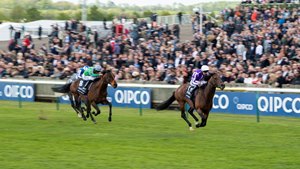Guineas and Derby Meets to be Held Later in Season


The first four classics of the British flat season will be delayed and staged later in the season, the Jockey Club announced April 7.
The QIPCO Two Thousand Guineas (G1) and One Thousand Guineas (G1), scheduled for the weekend of May 2-3, and the Investec Oaks (G1) and Derby (G1), June 5-6, will be held at a later date which will be announced after the suspension of British racing is lifted by the British Horseracing Authority.
The Jockey Club is in talks with the BHA and other key stakeholders regarding potential future dates.
British racing is currently suspended until at least May 1 due to the COVID-19 pandemic.
A statement from Phil White, London regional director for Jockey Club racecourses, indicates that there could be logistical difficulty preventing the Derby festival being staged behind closed doors. The Downs, in the middle of the racecourse, is a public space therefore it would be difficult to regulate members of the public congregating in that area.
The Derby has been staged at Epsom for every season since the Second World War. Dante in 1945 was the last winner when the race was held at Newmarket.
White said: "Following consultation with our many event stakeholders and in order to comply with current government guidance, given the unique nature of the Downs as a public space, sadly it is not practical to stage the Investec Derby Festival on June 5 and 6.
"We're now working with the sport to explore our options to reschedule, at minimum, the Investec Derby and the Investec Oaks, as part of delivering the 2020 classic program for 3-year-olds. We thank all involved for their pragmatism and patience as we work this through together."
The Jockey Club also stresses it will hope to have adequate spacing between the two classic meetings. Currently the gap is six weeks.
Amy Starkey, east regional director for Jockey Club racecourses, said: "With less than a month until the QIPCO Guineas festival, trainers need to know whether to step up preparations for their Guineas horses or put that on pause for a later date.
"The future is too uncertain at the moment and there is no opportunity for any preparation races before such important contests for the 2020 classic generation.
"Therefore we feel now is the right time to take the decision to cancel the QIPCO Guineas festival and turn our attention to determining, in conjunction with the BHA, participants, and stakeholders, the earliest possible opportunity to reschedule the races."
Most bookmakers' ante-post terms and conditions stress that a bet will stand if a race has been rescheduled at the same racecourse. However, the bet will be void if the race takes place at a different track.
The classic races in Japan could also be adjusted. Japanese racing authorities will decide whether this weekend's fixtures can go ahead as planned at a meeting in Tokyo on Wednesday morning.
On Tuesday Japan's prime minister, Shinzo Abe, gave emergency powers to local government officials in Tokyo and several adjacent regions, with a range of measures including school closure and restriction of people's movement available to officials.
The state of emergency is not as severe as lockdowns in Europe and does not automatically mean the end of racing, since the sport has continued behind closed doors and so does not constitute a public gathering.
The Japan Racing Association is due to stage the opening classic of the season, the Oka Sho (Japanese One Thousand Guineas, G1) on Sunday at Hanshin, which is sited in the Hyogo Prefecture, one of those covered by emergency measures.
